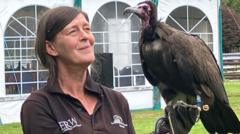How Are the Welsh Fighting to Save Endangered Vultures?

Published: 2025-08-26 05:05:22 | Category: wales
In an ambitious effort to save endangered species, Falconry Experience Wales is working to breed hooded vultures in Powys. These vultures, like many species across Africa and Asia, are critically endangered, with fewer than 150,000 remaining in the wild. Their decline poses severe consequences, including potential health risks for humans, as they play a crucial role in the ecosystem by disposing of dead animals. The centre's owner, Luce Green, views this initiative as her lifelong passion and "labour of love."
Last updated: 29 October 2023 (BST)
Key Takeaways
- Hooded vultures are critically endangered, with numbers dropping below 150,000.
- The decline of vultures can lead to health crises by spreading diseases.
- Falconry Experience Wales aims to breed these birds to bolster their population.
- Current breeding efforts involve a male named Togo and a female named Hope.
- Successful breeding could lead to the eventual release of vultures back into the wild.
The Importance of Hooded Vultures
Hooded vultures play an essential role in maintaining ecological balance. They are scavengers that feed on dead animals, effectively preventing the spread of diseases. In India, for example, the decline of vulture populations has been linked to the deaths of approximately 500,000 people, as these birds were crucial in disposing of carcasses that could harbour pathogens.
The Decline of Vulture Populations
According to a 2021 assessment by the International Union for Conservation of Nature (IUCN), the adult population of African hooded vultures has decreased to around 131,000. This alarming trend continues, and the species is now classified as critically endangered. Several factors contribute to their decline, including poisoning, habitat loss, and illegal hunting.
Challenges Facing Breeding Efforts
Breeding hooded vultures is fraught with challenges. One significant threat is poisoning, often caused by poachers who fear that vulture circles will reveal their locations. Traditional medicine practices that utilise vulture parts also exacerbate the issue. As a result, Falconry Experience Wales is focused on creating a safe breeding environment for these birds.
Breeding at Falconry Experience Wales
At the heart of this conservation project are Togo, a male vulture raised by hand, and Hope, a female. Luce Green and her partner, Barry Macdonald, have dedicated decades to the study and care of these rare birds. Their goal is to breed one chick at a time, as every chick counts in the fight against extinction.
The Vision for the Future
Green hopes that the offspring produced will eventually be part of a release programme to restore the wild populations. However, due to the precarious situation in Africa, their current focus is on increasing the captive population. Green emphasises the need for careful management of hooded vultures in human environments, with only about 200 individuals recorded in captivity.
Expert Insights on Vulture Conservation
Campbell Murn, Head of Research and Education at the Hawk Conservancy Trust, stresses the importance of breeding these birds. He outlines three key reasons for the conservation efforts: the welfare of the vultures, the health of human populations, and the health of the environment. Murn compares vultures to "canaries in the coal mine," indicating that their decline signals broader ecological issues that could lead to significant health problems.
What Can Be Done to Help?
Conservation efforts like those at Falconry Experience Wales are vital in reversing the trends of vulture population decline. Supporting such initiatives can take many forms, from financial contributions to raising awareness about the importance of these birds. The public can also participate in conservation efforts by avoiding products that exploit wildlife and advocating for environmental protection.
The Broader Impact of Vulture Decline
The implications of losing vultures extend beyond the immediate ecological impact. As scavengers, vultures help to maintain a healthy ecosystem, and their absence can lead to increased numbers of vermin and diseases, ultimately affecting human health. Thus, the conservation of vultures is not only an environmental issue but also a public health concern.
Conclusion: A Call to Action
As the situation for hooded vultures becomes increasingly dire, the efforts of Falconry Experience Wales and other conservation groups are more crucial than ever. The success of breeding programmes could pave the way for a brighter future for these majestic birds. Everyone can play a part in conservation, and raising awareness is a vital step in ensuring that vultures continue to thrive in our ecosystems.
How will you contribute to the future of wildlife conservation? #VultureConservation #FalconryExperienceWales #EndangeredSpecies
FAQs
Why are hooded vultures endangered?
Hooded vultures are endangered due to factors such as poisoning, habitat loss, and illegal hunting, which have led to a significant decline in their populations.
What role do vultures play in the ecosystem?
Vultures are scavengers that feed on dead animals, preventing the spread of diseases and maintaining ecological balance.
How many hooded vultures are in captivity?
There are approximately 200 hooded vultures in captive environments, according to current estimates.
What is Falconry Experience Wales doing to help vultures?
Falconry Experience Wales is working to breed hooded vultures with the aim of increasing their population and eventually releasing them into the wild when it is safe to do so.
How can the public support vulture conservation?
The public can support conservation efforts by donating to organisations, raising awareness about the issues facing vultures, and avoiding products that exploit wildlife.



